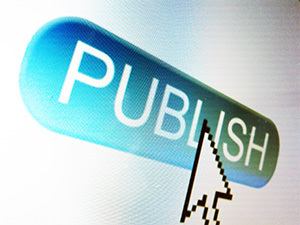
DBW has been conducting in-depth author surveys over the past few years, releasing annual reports on the state of publishing from the viewpoints of these survey respondents. The results, which will be compiled, examined, and released at next week’s Digital Book World event, attempt to give a clear picture of how authors are faring in both traditional and self-publishing, along with their perceptions of the industry at this time.
A commenter on a recent blog post of Hugh Howey’s linked to his own survey responses, which at the time gave a preliminary breakdown of others’ responses up to that point. Far from scientific, it does provide a peek into how authors are responding, as well as to the types of questions that industry experts still consider to be relevant at this point in the digital revolution.
The preliminary, basic data can be viewed here.
According to the data at the time of the respondent’s participation, 2,188 people answered the question, “What kind of publisher has published your books?” and an additional 778 people skipped the question. Remember, these numbers represent the number of authors who had answered the survey up to the time that the respondent answered; that number may have easily grown by now. But of those two thousand-plus individuals, almost 72% of them have self-published, an additional 15% or so published through a company which they also own or co-own.
Even more interesting than most of the other data is the all-important income question. With so many respondents reporting that their primary reason for writing and publishing involves earning money or quitting a full-time job, it was telling that only 281.7% of the nearly three thousand answers earn more than the annual income of a full-time minimum wage employee; 42.9% of those who answered the question earned between $0 and $499 last year.
But if authors are not earning much, why are so many of them stating they will continue to self-publish?
The usual answers to that question still apply. Authors carve the creative control over their work, and they’ve come to realize that self-publishing affords them an almost equal chance for income potential as a traditional publishing deal, as evidenced largely by the fact that 24.8% of those who responded said they’d published through a traditional publisher who offered a royalty split, but who did not pay them an advance.
While the final report will not be available until the DBW event, last year’s report on the same topic was conducted in conjunction with Writer’s Digest magazine, meaning many of the respondents had the opportunity to participate due to their subscription to the magazine; WD has a slant towards the traditional publishing industry, and features information in each issue on how to get published via that route. Just as with last year’s survey, a large number of the participants are also not yet published, or have not even completed a manuscript, which could cause the income discrepancy between successful, satisfied respondents and those who said they are dissatisfied with their level of success.
Last year’s report was “debunked” by a number of sources, including this piece posted on the Alliance of Independent Authors blog.
[ad#After Post]
Mercy Pilkington is a Senior Editor for Good e-Reader. She is also the CEO and founder of a hybrid publishing and consulting company.